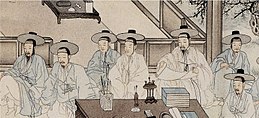
Back Koreane AF كوريون Arabic Кореял AV Koreyalılar AZ کورهلیلر AZB Корейҙар BA Карэйцы BE Карэйцы BE-X-OLD Корейци Bulgarian Coreans Catalan
| Total population | |
|---|---|
c. 81 million[1]
 | |
| Regions with significant populations | |
| South Korea c. 49,110,000 (2019)[a][2] North Korea 25,955,138[b][3] Diaspora as of 2021[update] c. 7.3 million[4] | |
| 2,633,777[4] | |
| 2,109,727[c][5] | |
| 818,865[d][4] | |
| 237,364[4] | |
| 175,865[e][4] | |
| 168,526[f][4] | |
| 158,103[4] | |
| 156,330[4] | |
| 109,495[g][4] | |
| 47,428[4] | |
| 36,690[4] | |
| 36,540[4] | |
| 33,812[4] | |
| 33,032[4] | |
| 25,417[4] | |
| 22,847[4] | |
| 20,983[4] | |
| 18,130[4] | |
| 18,106[4] | |
| 17,297[4] | |
| 13,667[4] | |
| 13,524[h][4] | |
| 13,055[4] | |
| 11,107[4] | |
| 10,674[4] | |
| 10,608[4] | |
| 9,473[4] | |
| 8,694[4] | |
| 7,744[4] | |
| 5,132[6][7] | |
| 3,771[4] | |
| Languages | |
| Korean,[8] Jeju and Korean Sign Language minorities | |
| Religion | |
| Predominantly : Irreligious Significant : Korean shamanic, Christian, and Buddhist | |
| Related ethnic groups | |
| Jejuans | |
| Part of a series on |
| Korean people |
|---|
| Culture |
| Music |
| Language |
| Cuisine |
| Dance |
| Religion |
| People |
| Diaspora |
 |
| Part of a series on the |
| Culture of Korea |
|---|
| Society |
| Arts and literature |
| Other |
| Symbols |
|
Koreans[i] are an East Asian ethnic group and nation native to the Korean Peninsula.[11][12][13][14] The majority of Koreans live in the two Korean sovereign states of North and South Korea, which are collectively referred to as Korea. As of 2021, an estimated 7.3 million ethnic Koreans resided outside of Korea.[4] Koreans are also an officially recognised ethnic minority in other several Continental and East Asian countries, including China, Japan, Kazakhstan, Russia, and Uzbekistan. Outside of Continental and East Asia, sizeable Korean communities have formed in Germany, the United Kingdom, France, the United States, Canada, Australia, and New Zealand.
- ^ "Korean". Ethnologue. Retrieved 5 November 2023.
- ^ "Foreign population in Korea tops 2.5 million". The Korea Times. 24 February 2020. Archived from the original on 16 July 2020. Retrieved 20 January 2023.
- ^ "Worldbank, 2020". Archived from the original on 27 February 2022. Retrieved 27 February 2022.
- ^ a b c d e f g h i j k l m n o p q r s t u v w x y z aa ab ac ad ae 재외동포현황(2021)/Total number of overseas Koreans (2021). South Korea: Ministry of Foreign Affairs. 2021. Archived from the original on 24 February 2021. Retrieved 21 August 2022.
- ^ 재외동포 현황 [Current status of overseas Koreans]. oka.go.kr. Office of Overseas Koreans, Republic of Korea. 2023.
- ^ 재외동포 본문(지역별 상세). Ministry of Foreign Affairs and Trade. 15 July 2011. p. 64. Archived from the original on 8 September 2021. Retrieved 25 February 2012.
- ^ "Wachtregister asiel 2012-2021". npdata.be. Retrieved 12 April 2023.
- ^ Koreans at Ethnologue (17th ed., 2013)

- ^ [1][dead link]
- ^ Julian Ryall, Tokyo (31 May 2016). "Polish firms employing North Korean 'slave labourers' benefit from EU aid". Telegraph.co.uk. Retrieved 6 June 2019.
- ^ Horai, Satoshi; Murayama, Kumiko (1996). "mtDNA Polymorphism in East Asian Populations, with Special Reference to the Peopling of Japan". American Journal of Human Genetics. 59 (3). Cambridge, Massachusetts: Cell Press: 579–590. PMC 1914908. PMID 8751859.
- ^ Yi, SoJeong; An, Hyungmi; Lee, Howard; Lee, Sangin (2014). "Ancestry informative SNP panels for discriminating the major East Asian populations: Han Chinese, Japanese and Korean". Annals of Human Genetics. 35 (10). Cambridge: John Wiley & Sons (published 2013): 477–485. doi:10.1097/FPC.0000000000000075. PMID 25029633. S2CID 43243512.
- ^ Siska, Veronika; Jones, Eppie Ruth; Jeon, Sungwon; Bhak, Youngjune; Kim, Hak-Min; Cho, Yun Sung; Kim, Hyunho; Lee, Kyusang; Veselovskaya, Elizaveta; Balueva, Tatiana; Gallego-Llorente, Marcos; Hofreiter, Michael; Bradley, Daniel G.; Eriksson, Anders; Pinhasi, Ron; Bhak, Jong; Manica, Andrea (2017). "Genome-wide data from two early Neolithic East Asian individuals dating to 7700 years ago". Science Advances. 3 (2) (published 1 February 2017): e1601877. Bibcode:2017SciA....3E1877S. doi:10.1126/sciadv.1601877. PMC 5287702. PMID 28164156.
- ^ Wang, Yuchen; Lu, Dongsheng; Chung, Yeun-Jun; Xu, Shuhua (2018). "Genetic structure, divergence and admixture of Han Chinese, Japanese and Korean populations". Hereditas. 155 (published 6 April 2018): 19. doi:10.1186/s41065-018-0057-5. PMC 5889524. PMID 29636655.
Cite error: There are <ref group=lower-alpha> tags or {{efn}} templates on this page, but the references will not show without a {{reflist|group=lower-alpha}} template or {{notelist}} template (see the help page).